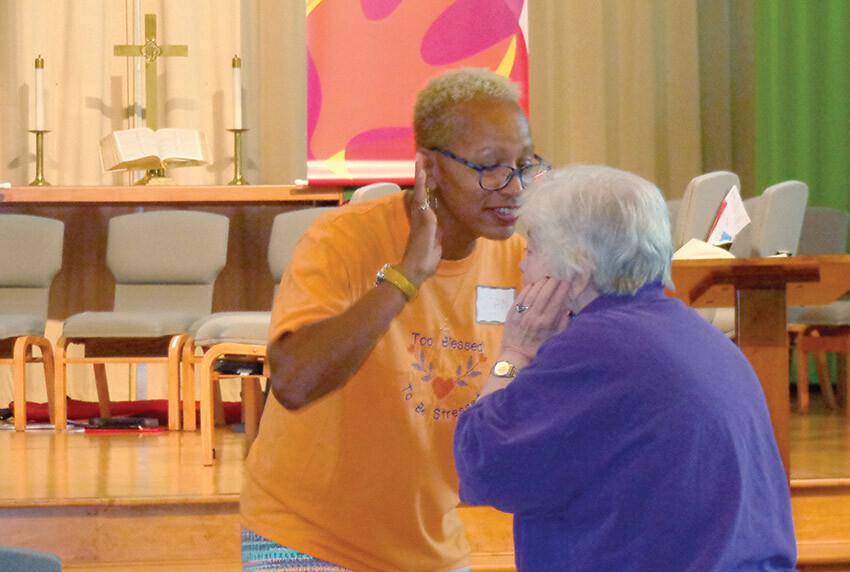Clergywomen’s choir meets to celebrate and remember
By Rev. Ruth A. Ward
Special to the UMConnection

The Revs. Joan
The two clergywomen danced together. Around them, people moved. Some said they weren’t dancers, but they, too, stepped energetically in time with the music. Fabric banners swirled and filled the sanctuary aisles.
Some of us stood silently, our banners forgotten, watching the joy that infused both of their bodies. Tears streamed down our faces and the lumps in our throats grew. “Hush, hush, somebody’s calling my name” filled the air. Later the tears increased as they danced again and we sang, “This is my story, this is my song; praising my Savior all the day long.”
Early in the 1980s, some of us gathered to dance, sing, study, and shout our praise to God who called and equipped us for this journey as some of the first clergywomen in The United Methodist Church. We gathered because we needed each other, not just to thrive, but too often, to survive.
We were called a clergywomen’s choir, but it was so much more than that. Small groups emerged to study the lectionary, examine issues related to racism plus a host of injustices facing the church and our society, and then we began to design liturgy.
We often sang for those who could not sing for themselves. We shared worship at the Quality of Life Retreats. We sang at the 1988 General Conference in St. Louis, Mo. We sang from our hymnals and
Something happened in the fall of 1982 after a clergywomen’s retreat that changed us. The Rev. Susan Beehler and Bishop Susan Morrison met with the Rev. Daisy Thompson, a local pastor in the Peninsula-Delaware Conference, and listened as she shared her experience in ministry, at times an excruciatingly painful journey.
Over and over again in the telling, she would pause and proclaim, “But I’d take nothing for the journey.” She’d take a breath and continue. When the telling was too much or too painful, she’d take another deep breath and affirm, “But I’d take nothing for the journey.”
Her powerfully poignant story gave voice and encouragement for the telling of our stories. We brought our “battered spirits, our broken dreams” and also discovered that we could say, “We’d take nothing for the journey.”
Beehler was the first to gather the fragments of our stories and weave them into a tapestry of music that nourished, soothed, and empowered us. She said, “I was able to work with your words and noodle melodies. I wanted music sing-able and accessible so we didn’t have to practice much. You don’t do it alone. You do it in
At our recent gathering, Sept. 11-12 at Epworth UMC in Rehoboth, Del., we remembered, gave thanks and danced. We celebrated the Rev. Kathryn (Kay) Moore’s 50th anniversary of ordination and full clergy status. Of the 33 of us who gathered, we have 1,125 years of ordained ministry. Only two who came had fewer than 28 years and one of them was consecrated in 2016.
We discovered once again that we had a safe place to sing, to tell our stories, to be energized, and be emotionally drained and filled at the same time.
When asked about how Shared Journey has helped them along the way, there were life-affirming reflections.
“For me, the dance is me allowing my spirit to speak to God,” said the Rev. Joan Carter-Rimbach. “Doing that with other women along the journey has allowed me to feel the strength of our oneness and our community. It has carried me in my ministry and my life.”
“These songs written by clergywomen give words and voice to the experience – to my experience – of what it means to be a woman in ministry,” said the Rev. Mary Kay Totty, “an experience that is at one and the same time amazing, awful, wondrous, worrisome, fatiguing, and fulfilling. But I’d take nothing for the journey.”
The Rev. Nancy Webb said that the “memorable gathering of Baltimore sisters who began a racism reflection group was transformational for my ministry. There were four African-American sisters and four white: Kay, Ruth Ann, Susan, Suzanne, LaReesa, Rebecca, Joan and me. I’ll never forget a meeting when Joan clearly and forthrightly addressed us. ‘You white sisters will have a celebration of Black History
“It had not occurred to me,” Webb said. “From that time forward it has been very important to lift that up wherever I am and to read something I haven’t read by an African-American sister.”
“The songs, the music, our gatherings were a life-line for me in my ministry. We loved each other in the midst of painful ministry settings and found
“I was welcomed by Baltimore Conference clergywomen while still in seminary,” said the Rev. Gayle Annis-Forder. “They provided financial assistance for me to attend the consultation in February 1983. I sang with them and knew they were my people. So many of the songs told and tell my story. ‘Zion’s Songs’ confirms that we ‘give each other power to survive’. It’s still tough to be a woman in ministry. I am grateful for the singing and dancing and praying and support, the energy, passions
“The BWC Clergywomen have played an important and supportive role in my ministry. They mothered me into ministry,” said the Rev. Vicky Starnes.
We are grateful to Bishop Peggy Johnson for her gracious financial support to help this gathering happen as well as the staff of Epworth Church in Rehoboth, Del.
The music and dancing will continue. We invite all clergywomen to come to the Baltimore-Washington Conference clergywomen’s Christmas lunch on Dec. 4.
If you are interested in purchasing a CD of “A Shared Journey” or in attending the Christmas Luncheon, e-mail the Rev. Deb Scott at .
